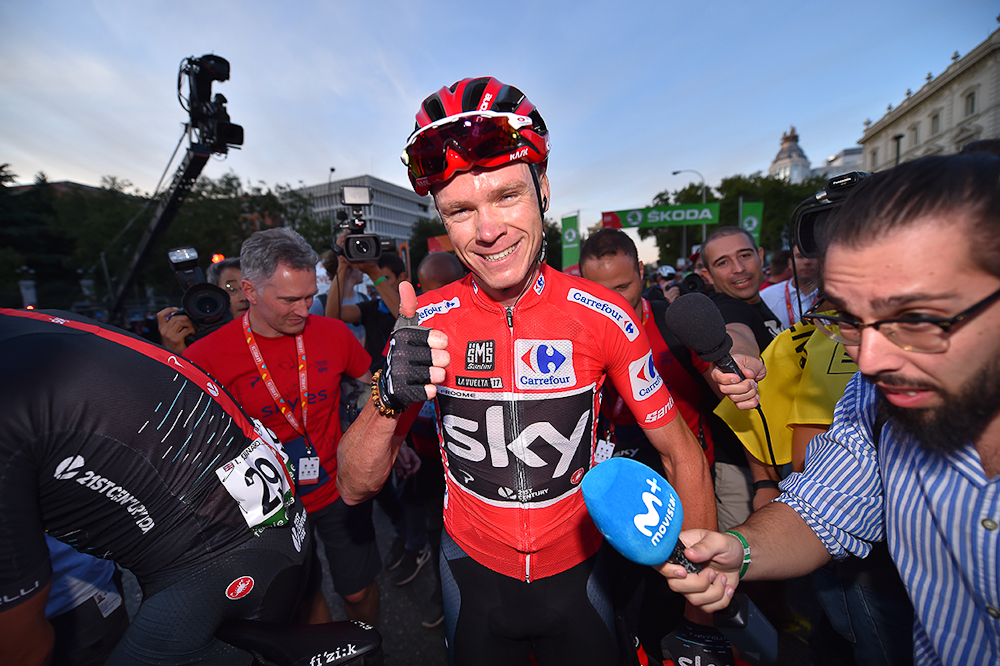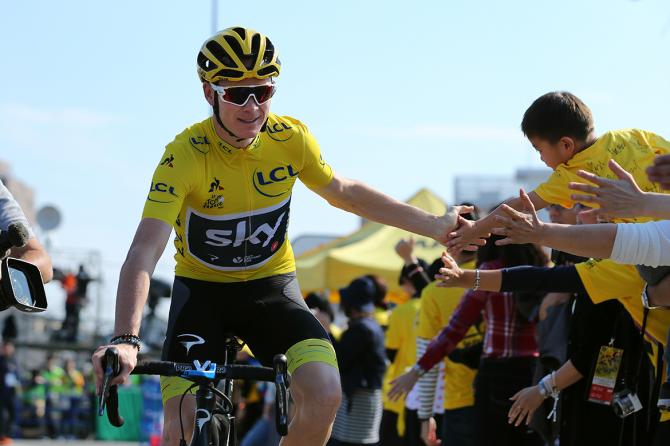Opinion: Chris Froome should withdraw himself from racing
Doesn't he have an ethical or moral obligation to his sport?

Chris Froome is the biggest name in world cycling, yet every day that passes with his situation unresolved only hurts his sport more. It’s time for the five-time Grand Tour winner to seize the initiative, argues Jeremy Whittle.
Timeline of Chris Froome's adverse analytical finding for salbutamol
Chris Froome nominated for Laureus World Sportsman of the Year
Lappartient: Team Sky should suspend Chris Froome
Chris Froome could accept salbutamol responsibility in hope of lenient ban
Vegni calls on UCI to guarantee race result if Chris Froome starts Giro d'Italia
Chris Froome's salbutamol case reportedly moves a step closer towards a verdict
The suggestion in the Italian media this week that Chris Froome may be involved in plea-bargaining with the UCI, in the hope of negotiating a lenient ban for his AAF, was met with firm denials, by Froome himself.
Subsequently, Cyclingnews, seeking further verification of the story, understands that there has been no direct contact between Froome’s representatives and the UCI and that the rider is still adhering to an “all or nothing” approach to his defence, with no timescale for completion of the investigation yet agreed.
With both Team Sky and the UCI remaining tight-lipped this weekend as to the current status of the case, all of those within the World Tour — not to mention millions of fans — remain in limbo. The media guessing game is set to continue.
Now, incredibly, the Giro d’Italia is demanding what is effectively cycling’s first ‘prenuptial agreement’ — that the UCI ‘guarantee’ the result, if Froome starts the Italian race. So will the Tour de France soon follow suit?
Whatever stage the process has reached, Froome, it is believed, is readying himself for a return to racing soon, as he builds towards his planned assault on the Giro and the Tour.
Legally, of course, he has the right to do so. But, as Froome himself has acknowledged when declining a TUE in 2015, there is a big difference between legality and ethics.
Get The Leadout Newsletter
The latest race content, interviews, features, reviews and expert buying guides, direct to your inbox!

Based on his past statements, Froome’s attitude towards a crisis that is harming both his sport and his reputation is at odds, both with who he says he is, and also with the values of ‘doing things the right way,’ that he and his team espouse.
In January 2017, Froome told the BBC that he refused a TUE near the end of the 2015 Tour on ethical grounds.
“It didn’t sit well morally with me,” he said, before adding: “It’s not good for sport in general that we’re discussing the validity of results.”
That same month, January 2017, Dave Brailsford repeated his mantra: “We do things the right way, we’ve always done things the right way.”
Of course, Brailsford’s definition of “the right way” has left some onlookers baffled, but without again trawling through the history of dubious staff appointments, inadequate record-keeping, and dodgy deliveries, it is Froome who now holds the power, and it is Froome who could change this particular game.
Froome needs to be on the right side of history here, seen as providing a solution to cycling’s ills, rather than exacerbating them, through months of denial as he races in Grand Tours, potentially winning them, only to be subjected to a possible subsequent sanction.
There are those who will argue that the five-time Grand Tour winner is caught between a rock and a hard place. Carrying on as usual, though, as if nothing has happened, is both crass and selfish and will taint 2018 for riders, promoters, sponsors and fans.
Continue racing, at the Giro and heaven forbid, the Tour, and he risks a lot more than a mere cup of urine being thrown in his face. Worse, if he were to be subsequently found culpable and stripped of any wins, his reputation would probably be destroyed for good.
So why should he opt to pull himself from racing?
His team is not part of the MPCC (in which case he would suspend himself) he has not been sanctioned, he has protested his innocence, and thus he has no legal obligation or commitment to fall on his sword.
But doesn’t he have an ethical or moral obligation to his sport and its stakeholders? What of the appeals to stand down from Christian Prudhomme, David Lappartient, and many of his rivals? What of all the talk of ‘doing the right thing’? Doesn’t that all have significant weight too?
He has publicly said that doubting results is damaging to his sport. He says he understands the pain of the past. How then can his conscience allow him to race before the process is complete?
“I’m also one of those people who’s been let down,” he said in July 2013. “I’ve also believed in people who have turned out to be cheats and liars. But I can assure you, I’m not.”
I would not claim to know him well, but my experience of Chris Froome, as a man, is that he is essentially straightforward. He is driven and ambitious of course, but also polite, respectful of his rivals and, apparently, his teammates. Despite the years of provocation, he has never publicly lost his temper with the fans or the media. Outwardly, he seems measured, reasonable.
But now is the moment when Chris Froome should take control.
If he really understands the pain of the past, if his moral conscience really gripped him so strongly in July 2015, then he needs to act honourably, by withdrawing himself from racing and ensuring that the uncertainty is resolved as soon as possible. Right now, that would serve his sport far better than mammoth training rides in South Africa.
Cycling fans are all too familiar with the well-trodden path of ambition and self-interest overriding ethics. No doubt the idea of benching himself will be scoffed at, deemed Utopian, naïve, but Froome could break that mould, by going beyond legality, beyond the language of due process and by doing ‘the right thing.’
He says that he has been let down too, that he understands the pain of past deceit. His team boss, one of the most powerful and influential figures in world cycling, insists that Team Sky do things ‘the right way.’
If that is the case, then they need to get on the right side of history, and fast, because this is a pivotal moment. If they don’t, if Froome competes and wins a Grand Tour only to be later sanctioned, then he and his team will forever be seen under the same dark cloud as those that came before them.